You notice some specks of sediment in the water coming out of your kitchen sink faucet. But you have a water softener, why are you getting sediment in your water?
Does A Water Softener Filter Water? A water softener is not a filter. Although large pieces of sediment can get filtered out by a water softener, small pieces of sediment will simply pass between the water softening resin, and continue out of the water softener. Because of this, you may also need a separate filter.
There are several ways to remove various impurities from water. Water softeners remove hard minerals using a process called ion exchange. Particles can be removed from water using a filter. They are very different technologies, that serve very different purposes.
But if a water softener is removing hard minerals from the water, isn’t it filtering the water?
Not exactly! A water softener uses a process called ion exchange to remove hard minerals from the water. Ion exchange is when one charged ion is replaced for another. (Source)
Inside of a water softener is a resin that looks a bit like sand. Water softening resin beads look a little like a ball of yarn as it has grooves and gaps in it that give ions a place to settle in.
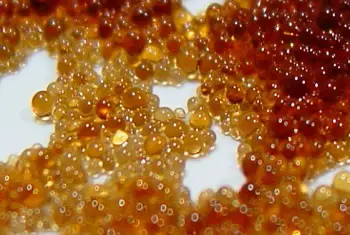
When water softening resin is new, these small gaps are empty, but as water runs over the bead, the hard minerals that are in the water are attracted to the bead by a small charge.
Have you ever rubbed a balloon over your hair and then tossed it up to the ceiling and watch it cling to the ceiling? Well, that’s very similar to what happens when hard minerals pass by a bead of water softening resin.
The hard minerals in the water get pulled towards the softening resin bead and cling to it, leaving the water free of the hard mineral.
By using enough water softening resin inside of a water softener, it will remove large amounts of hard minerals before being overloaded with hard minerals. When it gets to this point, the hard minerals need to be cleared from the resin by ion exchange.
This is where the salt that you add to the brine tank comes into play.
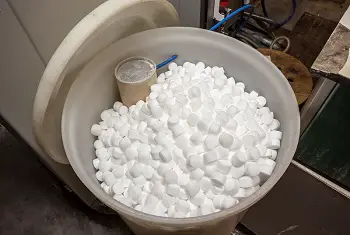
When a strong salt solution known as brine runs over the water softening resin beads, the sodium ions of the brine have a stronger attraction to the bead than the hard mineral ion. Because of this, the hard mineral falls off of the bead and the sodium ion takes its place.
Well, that all sounds very nice and very confusing, but it’s really pretty simple.
Hard water goes into the water softener and runs over the water softening resin. As it does this, the hard minerals are removed from the water and held by the water softening resin.
When the resin has collected its optimum amount of hard minerals, the water softener uses the brine from the salt tank to clean the hard minerals off of the water softening resin and rinse them away so that the resin can remove more hard minerals from the water.
And that’s how a water softener removes (but does not filter) hard minerals from your water.
So what does a water filter do that’s different than a water softener?
A water filter “captures” sediment from the water and holds it in the filter. It allows the water to pass through a filtering material but traps the unwanted debris.
When sediment gets trapped inside of a filter, the filter either needs to be cleaned, emptied or replaced.
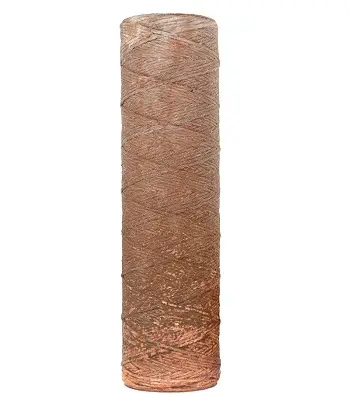
Some water filters are made for a single-use, once the filter has captured its share of sediment, it needs to be replaced with a new one. This can be expensive but in some cases, it is the best solution.
Water filters that are made from polyester or other highly durable material, may be able to be rinsed off and reused depending on the type of material it is filtering.
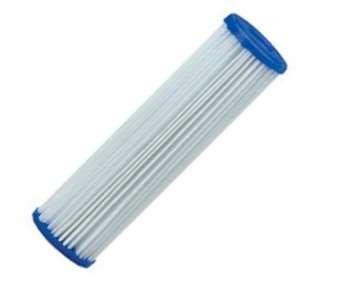
But even these water filters don’t last forever, and I don’t recommend reusing them more than 1 or 2 times.
Many bag water filters are designed to be emptied and reused many times before they need to be replaced, but they are often most effective for filtering larger sized particles. Some bag type filters are single-use filters for removing highly undesirable contaminants in water.
For most residential whole house water filters, I recommend using either a Pleated Polyester filter for most sized sediment or a solid Spun-Polypropylene filter when finer particles need to be filtered from your water.
A water softener does not remove any odors from water. Except for iron.
Many people think that a water softener will not only soften their water, but it will eliminate any odors that may be in the water.
The primary minerals that a water softener will remove are calcium and magnesium, but a water softener will also remove iron from your water.
High levels of iron can cause your water to have a metallic smell to it.
This metallic smell can be removed by a water softener, but most odors are caused by particles that are not removed through the process of water softening.
A filter can remove particles that cause odors.
There are many filtering media that may be used to remove small particles that cause odors, but the most common that is considered to be the most cost-efficient is common carbon.
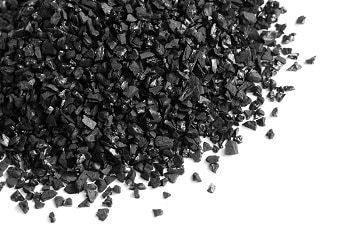
Well maybe calling it common is an understatement, because carbon is great at filtering out tiny odor-causing particles. And the best part is that carbon can be cleaned and reused for quite a long time.
A backwashing carbon filter can be used to filter many common odors such as sulfur, chlorine, and iron. Because carbon is a hard substance with a porous surface, it can trap particles in its surface pores, and then be cleaned over and over again.
What does a water softener remove?
Calcium: A very common mineral that is often found in water, and a primary contributor to water hardness.
Magnesium: Another common mineral that contributes to water hardness.
Dissolved iron (Ferris iron): Iron deposits in the earth can be dissolved and carried in water. Iron in your water causes yellow, orange, and red staining, a metallic taste in your water, and even a metallic odor.
Manganese: Dissolve manganese creates a charcoal stain on water fixtures, and can give water an unpleasant odor and taste.
Chlorine: Chlorine is commonly used to disinfect municipal water supplies. It can have a strong smell and taste and can cause corrosion of water fixtures.
Water softening resin will remove chlorine from water, but in doing so, it will cause the resin to expand and lose its ability to remove minerals from water.
Check out my article on Can Water Softener Resin Go Bad.
What does a water filter remove?
Sand: Small grains of sand can get drawn up from a well, a simple sediment filter will catch them before they enter your home.
Dirt: Any time water moves in a well, it can stir-up dirt that is settled inside of the well. This dirt can easily be removed with a standard sediment filter.
Debris: Small pieces of plants or even tree roots can be carried along in your water from underground. Having a sediment filter will capture them.
Silt: Silt is a bit finer than standard sediment, so you will need a finer sediment filter to remove it from your water. In most cases, a 1-micron Spun-Polypropylene filter will usually do a fine job at removing fine silt.
Non-dissolved iron (Ferric iron): Iron particles in water can be filtered out, but it often requires a finer filter than regular sediment. In most cases, a 5-micron Spun-Polypropylene filter will be sufficient to remove non-dissolved iron from your water.
Clay: Clay is one of the more difficult particles to remove from water. It is very fine and often requires specialized filtering systems, but in some cases, using a 1-micron Spun-Polypropylene filter can take care of mild clay issues.
Chlorine: Chlorine is widely used to disinfect water, and can easily be removed using a Granular Activated Carbon (GAC) filter.
Dissolved Solids: Now we are talking about very small particles. When a solid (like salt) is dissolved into water, a standard filter will not be able to take it back out of the water.
Only by distilling the water, or by using a reverse osmosis drinking water system, can the dissolved solid be removed from the water.
So which one do you need?
For the most part, everyone needs both. That doesn’t mean that you have to rush and buy both. What I mean is that nearly all the water that we use comes from a well.
Whether or not it is your own private well or your water is provided by your city or town, at some point, the water coming into your home has come up from a well.
When water comes from a well, it can often bring sediment and other debris with it, if you get your water from a municipal water supplier, your water has most likely already been filtered to remove unwanted debris from it.
But that does not mean that it has been softened, mostly because the cost of softening a large amount of water to supply a city or town is far too high, and therefore the option of softening your water is usually left to the homeowner.
If you have a private well, there is a good chance that you may need a whole house water filter along with a recommended water softener. The sediment or debris in your water is usually easy to see, but determining how hard your water requires a water hardness test kit.
If you are noticing spots on your dishes, glasses and shower door, you most likely have hard water and should consider checking out my recommended water softeners.
But before you do, you will need to determine your water hardness using a water hardness test kit.

